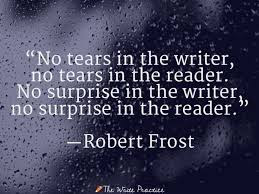Our quote today is by Octavia Butler, who is a science-fiction writer. She didn't sugarcoat her thoughts in this one. The reason I like the quote is that she highlights one of my two keywords for writers--persistence.
When we start writing, our work doesn't look professional yet. It isn't usually an example of strong writing, poetic prose, or scintillating sentences. We shouldn't expect it to be any of those things when we begin our writing journey.
If we're persistent and keep writing week after week, day after day, we can become a better, stronger writer. If a newbie writer writes something every other month, or even once a month, it's not enough. Cliche that it may be, the saying "Practice makes perfect" can be applied here.
A sculptor starts out making simple pieces of art, and he/she learns along the way. With each new sculpture, the artist improves and most likely learns something, too. A carpenter who is just starting out cannot be classified as a master carpenter, but after years as an apprentice and then on his own, he perfects his trade. If you've ever read any of Julia Child's books about the art of cooking, especially French cuisine, you'll know that she was not a born chef. She learned from her many mistakes, but the most important thing was that she persisted. She was a very determined woman.
Determined is what writers should also be. Persistence is what helps you continue with determination. Most poets don't write prize-winning poems with their first or second try. They pen scores of poems before they reach success in winning a prize or achieving publication.
Persistence in writing means writing something every day. You needn't write an entire story daily, but do write a few paragraphs, a journal entry, or a writing exercise. Write a letter to a friend! But write each and every day.
Persistence means not giving up when a writing project doesn't go well, or when rejections arrive. Keep going, keep learning.
Persistence means reading about the craft of writing. It means attending workshops and conferences to continue learning.
By now, you may have remembered, or guessed, my other keyword for writers. Patience. That persistence which I recommend takes patience. They go hand in hand, and each one can benefit new writers, intermediate writers, or the highly successful ones.
Octavia Butler knew what she was talking about!









